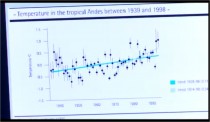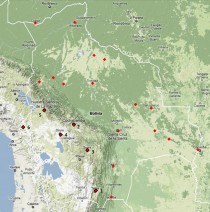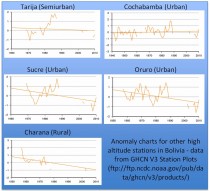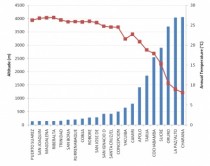Climate Science: Roger Pielke Sr.
There is an informative article by Ross McKittrick: McKitrick, Ross R. (2011) “Bias in the Peer Review Process: A Cautionary and Personal Account” in Climate Coup, Patrick J. Michaels ed., Cato Inst. Washington DC.
This article appears in the book: Michaels, Patrick J., 2011: Climate Coup: Global Warming’s Invasion of Our Government and Our Lives. Cato Institute. ISBN: 978-1-935308447
with the summary of its content
“A first-rate team of experts offers compelling documentation on the pervasive influence global warming alarmism now has on almost every aspect of our society-from national defense, law, trade, and politics to health, education, and international development.”
With respect to Ross’s chapter, Pat Michaels writes:
“The second chapter in this volume goes to the core of what we consider to be the canon of science, which is the peer-reviewed, refereed scientific literature. McKitrick’s and my trials and tribulations over journal publication are similar to those experienced by many other colleagues. Unfortunately, the Climategate e-mails revealed that indeed there has been systematic pressure on journal editors to reject manuscripts not toeing the line about disastrous climate change. Even more unfortunate, my experience and that of others are that the post-Climategate environment has made this situation worse, not better. It is now virtually impossible to publish anything against the alarmist grain. The piles of unpublished manuscripts sitting on active scientists’ desks are growing into gargantuan proportions...”
Pat is correct that the peer reviews process and, also, the funding of research, has become very politicized and biased.
Ross starts his article with the text [highlight added]
“Showing that the IPCC claim is also false took some mundane statistical work, but the results were clear. Once the numbers were crunched and the paper was written, I began sending it to science journals. Having published several against-the-flow papers in climatology journals, I did not expect a smooth ride, but the process eventually became surreal. In the end, the paper was accepted for publication, but not in a climatology journal. Fortunately for me, I am an economist, not a climatologist, and my career doesn’t depend on getting published in climatology journals. If I were a young climatologist, I would have learned that my career prospects would be much better if I never wrote papers that question the IPCC. The skewing of the literature (and careers) can only be bad for society, which depends on scientists and the scientific literature for trustworthy advice for wise policy decisions.”
His conclusion has the text:
“Some people might be tempted to defend climatology by saying that normal scientific procedures have broken down due to the intense policy fights and political interference. But in my opinion that confuses cause and effect. The policy community has aggressively intervened in climate science because of all the breaches of normal scientific procedures. The public has lost confidence in the ability of the major institutions of climatology, including the IPCC and the leading journals, to deal impartially with the evidence. It doesn’t have to be this way. My own field of economics constantly deals with policy-relevant topics with major public consequences. Of course, differences of opinion exist and vigorous disputes play out among opposing camps. But what is happening in climate science is very different, or at least is on a much more intense scale. I know of no parallels in modern economics. It appears to be a profession-wide decision that, due to the conjectured threat of global warming, the ethic of scientific objectivity has had an asterisk added to it: there is now the additional condition that objectivity cannot compromise the imperative of supporting one particular point of view.
This strategy is backfiring badly: rather than creating the appearance of genuine scientific progress, the situation appears more like a chokehold of indoctrination and intellectual corruption. I do not know what the solution is, since I have yet to see a case in which an institution or a segment of society, having once been contaminated or knocked off balance by the global warming issue, is subsequently able to right itself. But perhaps, as time progresses, climate science will find a way to do so. Now that would be progress.”
Both Pat and Ross are correct that a prejudice exists in the climate science community with respect to publication and in funding. My experiences have been similar to theirs.
I have posted on this subject in my posts. Read more and see links.
As the recession drags on, energy prices rise, the federal deficit continues to soar and the S&P has now declared the outlook of US credit as unstable, the Obama administration seems to think that now is a good time to spend money on experimenting with the green energy agenda. The proverbial laboratory is going to begin in California.
Since there aren’t presently any private investors who see a commercial marketplace for a solar power project, the U.S. Energy Department will be supplying a green energy conditional guaranteed loan of $2.1 billion to support “the Blythe Solar Power Project,” reported CNS News on Tuesday.
Energy Secretary Steven Chu noted that the green energy loan amount “is the largest amount ever offered to a solar project through the Energy Department’s loan office.”
He went on to claim that over 1000 jobs will be created and that the economy would be strengthened as a result of green energy solar projects, even though there isn’t a commercial marketplace demand for what is being produced. In addition, “The Department of Energy has issued loan guarantees or offered conditional commitments for loan guarantees totaling $21 billion to support 22 clean energy projects across 14 states.” Projects are supposed to include “wind, geothermal, solar, biofuels and nuclear.”
Meanwhile, Republicans are claiming that the price of gas is being pushed higher to assist Washington liberals and the Obama administration with their political agenda, according to World Net Daily
House Natural Resources Committee Chairman Doc Hastings (R-Wash) pointed out that, “We need to look at the actions of this administration, which are leading to more of a domestic shortage of energy production in this country - whether you are looking at the outer continental shelf or whether you are looking at offshore lease sales.”
The Obama administration’s oil moratorium has caused over 12,000 jobs to be lost, and 12 oil rigs have left the Gulf for locations such as Nigeria, Egypt and Brazil.
Moves such as this by the Obama administration have caused “the nation’s energy, manufacturing, and job sectors [to become] ‘paralyzed’ in terms of growth, and [companies] are terrified of the regulations imposed by the federal government,” political analyst Dick Morris stated at a gathering of both Christians and non-Christians during the Justice Institute’s annual gala in California according to One News Now.
The above is simply the newest version of the old cap and trade, which Washington has recently referred to as the nationwide renewable-electricity standard, or RES.
The administration has got its head in the sand (some suggest somewhere else) ignoring the reality of the failed green policies in Europe and elsewhere, with lost jobs, skyrocketing energy costs and increased unemployment. Maybe that is the real intent of the administration. The more people dependent on the government, the more, they think, that would have to vote to keep their government support going.
By Verity Jones, Digging in the Clay
Last week the Guardian published an article reporting from Bolivia on plans to introduce new laws:
Bolivia is set to pass the world’s first laws granting all nature equal rights to humans. The Law of Mother Earth, now agreed by politicians and grassroots social groups, redefines the country’s rich mineral deposits as “blessings” and is expected to lead to radical new conservation and social measures to reduce pollution and control industry.
This is Bolivia setting itself up as a victim of climate change and, as such, at the mercy of Western economies, demanding large cuts in carbon emissions at the UN climate talks.
Bolivians are living with the effects of climate change every day...Bolivia is struggling to cope with rising temperatures, melting glaciers and more extreme weather events including more frequent floods, droughts, frosts and mudslides.
Research by glaciologist Edson Ramirez of San Andres University in the capital city, La Paz, suggests temperatures have been rising steadily for 60 years and started to accelerate in 1979. They are now on course to rise a further 3.5-4C over the next 100 years. This would turn much of Bolivia into a desert.
These issues were also discussed in an accompanying video report. This is a screenshot of the graph shown by Ramirez (enlarged here):

According to the trends used here warming for the period 1974-1998 was 0.34 deg.C per decade (paler blue line) (3.4 deg.C per century).
How much of a temperature rise?
Ramirez says 3.4C per century. And the graph appears to stop in 1998. Hmm. One of the issues raised previously for this part of the world was the lack of data reported from Bolivia into the climate data sets, with no stations in GHCN V2.mean and GISTEMP after 1990 (see E.M. Smith’s The Bolivia Effect).
GHCN V3, released in September and still in ‘Beta’ testing, has at least 18 stations with data in 2009/10. Here’s the data for La Paz/Alto (enlarged):

Top Panel: Unadjusted Data (L-R) Months x Years; key for monthly data; Unadj anomaly plot. Lower Panel: Adjusted Data (L-R) Months x Years; key for monthly data; Adjusted anomaly plot.
The adjusted data, corrected for instrumental changes and station moves etc. shows the warming he was talking about, and its acceleration after 1979, but he neglects to mention that more recent data shows a drop of around 1.5C, falling back to the level of 1940-1980. Oh dear - another case of hiding the decline But that’s just La Paz/Alto. It is a large city that has been rapidly growing, particularly El Alto, surrounding the airport. In fact from another article by the Guardian’s John Vidal explains the growth of the city that has surrounded the airport and weather station (possibly contributing to the temperature rise):
Poor El Alto is the satellite city of rich La Paz, overlooking the capital of Bolivia from up in the altiplano. In 1952 it was little more than a village; in 1960 it had fewer than 30,000 people; now it has exploded into a metropolis with up to 1 million or more…
La Paz / Alto from Google Earth, showing location of weather station according to GHCN. Marker from Google Earth KML files available here. (see also)
So what of other stations?
Bolivia is a country with distinct climate zones - basically lowland tropical/seasonal and high altitude cold/semi arid.
Five stations besides La Paz/Alto are high altitude. The following map shows not only the stations, but also the terrain:

GHCN V3 Stations in Bolivia.
High altitude stations are: 1. Tarija 1854m; 2. Cochabamba 2548m; 3. Sucre 2903m; 4. Oruro 3702m; 5. La Paz/Alto 4038m; 6. Charana 4054m. Background map from Google.
Other than La Paz/Alta, the five high altitude stations where a trend is derived show no sign of catastrophic warming when data after 2000 are taken into account. In fact it is quite the opposite, and more than that, presenting the data only up to 1998 was a convenient cherrypick.

Enlarged here.
Of lowland stations, seven (Cobija (R), Riberalta (R), San Ignacio D (R), Santa Cruz/El (U), San Jose De (R), Puerto Suarez (R) and Yacuiba (R)) show a warming trend, which seems to be greatest for those towns with highest population growth (note that looking on Google Earth, many seem far from rural); San Joaquin (R) and Rurrenabaque (R) are dead flat, and the remaining six (Concepcion, (R) Magdalena (R), San Borija (R), Trinidad (S), Robore (R) and Camiri (R)) have a strong cooling trend. Overall, there appears to be no rising temperature crisis in Bolivia.
Vidal’s second article does give something away:
Hundreds of thousands of people have flooded in from the countryside to find work and opportunity, but increasingly the reason they give for moving is that frequent droughts, erratic rainfall, heatwaves, unseasonal frosts and floods have made conditions too hard to grow crops. Bolivia has had five major droughts or heatwaves, as well as floods and major mudslides in the past decade. Few people in El Alto could be classed entirely as “climate refugees”, but the changing physical environment is clearly one of the new drivers of people to this burgeoning city.
I have huge sympathies for people in developing nations who rely on subsistance farming and natural supplies of water, and the loss of Andean glaciers is indeed a concern for the region, however, this kind of reporting does no-one any favours.
See full report and links to city data in the excellent investigative report.



